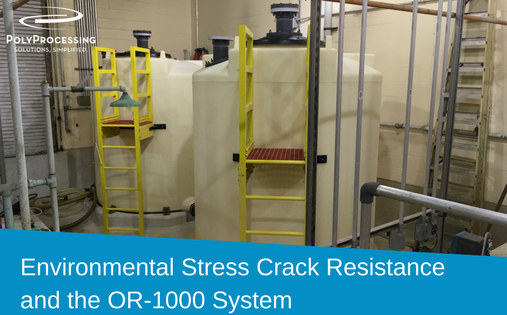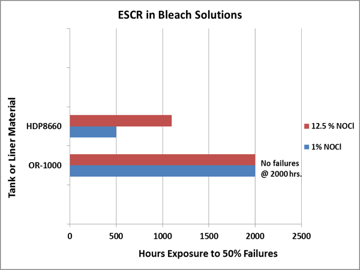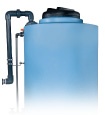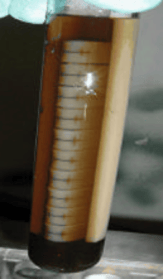Environmental Stress Crack Resistance and the OR-1000 System

Poly Processing Company works with leading universities to develop engineered polymer systems that will perform above and beyond any standard “off the shelf” polyethylene in harsh, oxidizing environments. One of these engineered polymer systems is the OR-1000 system. Poly Processing Company had the OR-1000 system tested by a leading university for its ability to withstand Environmental Stress Cracking.
Testing for Environmental Stress Crack Resistance
The most widely used and accepted test for environmental stress crack resistance (ESCR), especially in the rotational molding industry, is the bent strip method, per ASTM D1693. Ten rectangular test samples are severely bent, or stressed, and then immersed in the chemical of interest at elevated temperature.
In Poly Processing's case the tests conditions were chosen to simulate conditions encountered in bleach manufacturing, concentrations of 1% and 12.5% and temperature of 50°C. The figure below shows the time for 50% specimen failure, or F50, for the HDPE, High Density Polyethylene, (Linear polyethylene) material and the OR-1000™ system in the presence of 1% and 12.5% sodium hypochlorite solutions at 50°C. For the HDPE at 1% bleach concentration, 50% failure occurs at 500 hours test time, while at 12.5% concentration 1200 hours are required for 50% failure. By comparison, the OR-1000™ system shows no failures in either solution after 2000 hours of testing. This would indicate that the OR-1000™ system offers decreased risk of catastrophic cracking failures compared to conventional rotational molding HDPE resins such as Exxon Mobil HDP8660 in bleach containment applications.
Summarizing the ESCR data from the testing, we can conclude...
- Storage tanks using the next generation OR-1000™ system would be expected to provide lower risk of failure due to stress cracking than those manufactured from HDPE Linear polyethylene rotational molding resins in bleach chemical containment applications. Minimizing risk of catastrophic cracking failures allows full advantage of the enhanced long-term antioxidant protection offered by the OR-1000™ system.
- The fact that ESCR of the HDPE material is significantly reduced in comparison to OR-1000™ system at bleach concentrations as high as 12.5% indicates the potential for similar catastrophic cracking failure when conventional rotational molding linear polyethylenes are used to contain other corrosive chemicals such as acids and bases, even at concentrations greater than 10 percent. The combination of polymer design and additive system offered by the OR-1000™ system presents a superior alternative designed to minimize long term stress cracking as well as long term oxidation/embrittlement failure risks associated with containment of corrosive chemicals, whether in dilute or concentrated solution form.
Learn more about environmental stress crack resistance by reaching out to a chemical storage tank expert today.
- October 25, 2016
About Poly Processing
Posts By Topic
Tech Talk Podcast Episodes
Subscribe By Email
Recent Posts
- Ferric Chloride Storage: What Operators Need to Know Before Choosing a Tank
- Wastewater Treatment: Modern Approaches to Sludge Removal & Chemical Management
- Why Cycling Causes Tank Failure: Tips for Prolonging Tank Life
- Small Changes in Tank Selection for Big Long-Term Cost Benefits
- NSF Certification vs. FDA Compliance: Understanding Chemical Tank Standards
Tank Configurator

Find the recommended tank and system components for your chemical storage challenge.
Configure a Tank Package



